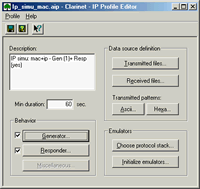|
|
|
Clarinet H323 features
Presentation
The Clarinet-system is a powerful Protocol Test
platform supporting VOIP family (H323 & SIP) protocol over Ethernet,
ATM, ISDN, and Vseries interfaces. It offers a wide
variety of functions:
- Monitoring
- Programmable simulation
- Emulation
|

Large snapshot
|
|
The flexibility and the user-friendly
interface of the software provides the user with a way to use it for
product development, engineering, or field trials.
|
Standard Features
Interface connection
Analysis Functions
Emulation functions
Programmable simulation
Physical Interface
- Ethernet 802.3 interfaces 10/100M
- One Data link (B channel) over ISDN BRI and PRI interfaces
- One Data link over V24, V35, V36, X24 interfaces.
- One data-channel (1 TS) + One data-channel (1-31 aggregated TS)
over E1 interfaces
- One data-channel (1 TS) + One data-channel (1-24 aggregated TS)
over T1 interfaces
- Two data-channels (vcc) over STM1 & E3 interfaces
Protocol Event Generation
- Ethernet: MAC 802.3 events,
- Vseries Asynchronous events
- E1, T1 Data channel: BOP events,
- ATM: CS-PDU events
Statistics Event Generation
- Event counters
- Counters by PDUs type on IP, TCP...
- Data-flow counters for low layer
Protocol Specification for Display
- Each channel specified with a protocol stack of 7 decoding levels:
- MAC / BOP envelope,
- IP layers decoding:
- LCP, PPP, Cl-IP
- IP family: TCP, PAP, CHAP, ARP
- IPX
- H323 family:
- TPKT, H225, H245, T123, T125, RAS, RTP, RTCP,
X224
- Full H323 ASN1 PER decoding
- IP addresses, UDP/TCP port identifications
- Event-Editor functions for events formatting
and filtering
Simulation features
- IP simulation
- Datagrams exchange:
- Generator (1 to 50 destinations)
- Responder (from different destinations)
- Automatic fragmentation and reassembly procedure
- TCP simulation
- Establishment of communications:
- Generator (1 to 50 destinations)
- Responder (from 20 destinations)
- Automatic fragmentation and reassembly procedure
MAC Layer:
- Setting of Parameters: address and header
IP layer:
- Setting of Parameters: address and header
TCP layer
- Setting of Parameters: Port and header
H323 layer
- Setting of Protocols RAS, H245 , H225 and
Parameters (time-limits)
API
- Use of CLARINET-Development C language
- Microsoft format library.
- Level N simulation using N-1 emulation on SS7 channel.
|
